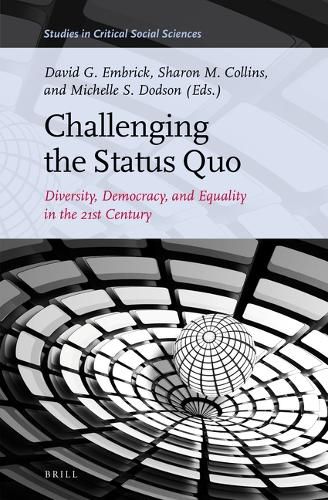Readings Newsletter
Become a Readings Member to make your shopping experience even easier.
Sign in or sign up for free!
You’re not far away from qualifying for FREE standard shipping within Australia
You’ve qualified for FREE standard shipping within Australia
The cart is loading…






In Challenging the Status Quo: Diversity, Democracy, and Equality in the 21st Century, David G. Embrick, Sharon M. Collins, and Michelle Dodson have compiled the latest ideas and scholarship in the area of diversity and inclusion. The contributors in this edited book offer critical analyses on many aspects of diversity as it pertains to institutional policies, practices, discourse, and beliefs. The book is broken down into 19 chapters over 7 sections that cover: policies and politics; pedagogy and higher education; STEM; religion; communities; complex organizations; and discourse and identity. Collectively, these chapters contribute to answering three main questions: 1) what, ultimately, does diversity mean; 2) what are the various mechanisms by which institutions understand and use diversity; and 3) and why is it important for us to rethink diversity?
Contributors: Sharla Alegria, Joyce M. Bell, Sharon M. Collins, Ellen Berrey, Enobong Hannah Branch, Meghan A. Burke, Tiffany Davis, Michele C. Deramo, Michelle Dodson, David G. Embrick, Edward Orozco Flores, Emma Gonzalez-Lesser, Bianca Gonzalez-Sobrino, Matthew W. Hughey, Paul R. Ketchum, Megan Klein, Michael Kreiter, Marie des Neiges Leonard, Wendy Leo Moore, Shan Mukhtar, Antonia Randolph, Victor Erik Ray, Arthur Scarritt, Laurie Cooper Stoll.
$9.00 standard shipping within Australia
FREE standard shipping within Australia for orders over $100.00
Express & International shipping calculated at checkout
In Challenging the Status Quo: Diversity, Democracy, and Equality in the 21st Century, David G. Embrick, Sharon M. Collins, and Michelle Dodson have compiled the latest ideas and scholarship in the area of diversity and inclusion. The contributors in this edited book offer critical analyses on many aspects of diversity as it pertains to institutional policies, practices, discourse, and beliefs. The book is broken down into 19 chapters over 7 sections that cover: policies and politics; pedagogy and higher education; STEM; religion; communities; complex organizations; and discourse and identity. Collectively, these chapters contribute to answering three main questions: 1) what, ultimately, does diversity mean; 2) what are the various mechanisms by which institutions understand and use diversity; and 3) and why is it important for us to rethink diversity?
Contributors: Sharla Alegria, Joyce M. Bell, Sharon M. Collins, Ellen Berrey, Enobong Hannah Branch, Meghan A. Burke, Tiffany Davis, Michele C. Deramo, Michelle Dodson, David G. Embrick, Edward Orozco Flores, Emma Gonzalez-Lesser, Bianca Gonzalez-Sobrino, Matthew W. Hughey, Paul R. Ketchum, Megan Klein, Michael Kreiter, Marie des Neiges Leonard, Wendy Leo Moore, Shan Mukhtar, Antonia Randolph, Victor Erik Ray, Arthur Scarritt, Laurie Cooper Stoll.